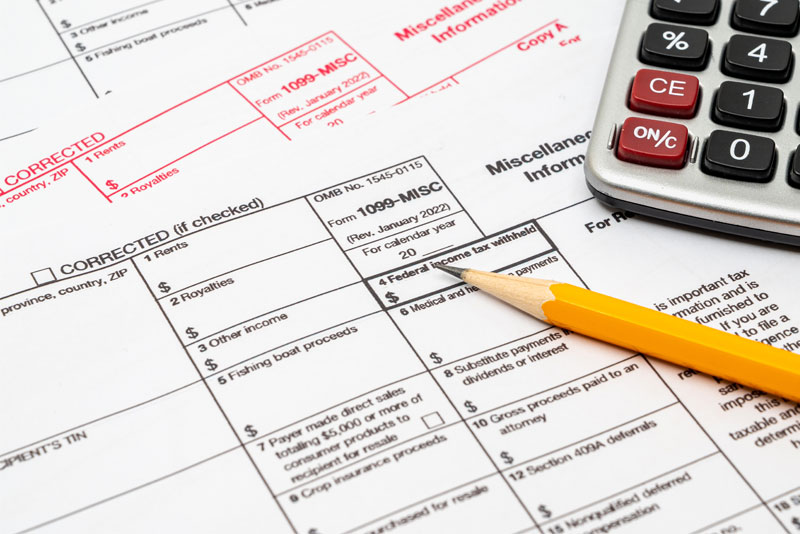Many freelance professionals and independent contractors operate as Limited Liability Companies (LLCs). The requirements for when a business should send a 1099 form to an LLC vary, as does the 1099 form to send.
Generally speaking, this is when LLCs should or should not receive a 1099:
- When a single-member LLC is taxed as a Sole Proprietorship or a multi-member LLC is taxed as a Partnership, any business that pays the LLC $600 or more for services in the year must send it a 1099-NEC (Nonemployee Compensation) form.
- If a business has sold $5,000 or more of consumer products to an LLC for resale, it may send Form 1099-NEC or 1099-MISC.
- If an LLC is taxed as an S Corporation or a C Corporation, no 1099 is necessary under most circumstances.
Let’s look a little more closely at the various 1099 forms and their usage.
How Do You Know if an LLC Needs a 1099?
The name of a Limited Liability Company alone won’t tell you if it’s taxed as a disregarded entity (Sole Proprietorship or Partnership) or a C Corporation. So how can you know whether a 1099 form is necessary? Request a W-9 (Request for Taxpayer Identification Number and Certification) form.
Along with other pertinent information, Form W-9 requests the vendor’s federal tax classification. If S Corporation or C Corporation is noted on the form, then it’s likely no 1099 will be required.
1099-NEC vs. 1099-MISC
The two most commonly issued 1099 forms to self-employed individuals (including owners of LLCs) are the 1099-NEC and 1099-MISC. Both are considered “information returns,” as they supply details to support what the issuing businesses and self-employed recipients report on their tax returns. You can find a complete list of the types of payments reported on those forms and other details on the IRS’s website. Below, find an overview of each form’s purpose and a list of common situations when the IRS requires one or the other.
Types of 1099-NEC Payments
The 1099-NEC is used mainly for reporting compensation of $600 or more for services rendered.
Examples of 1099-NEC usage:
- Compensation for services provided, which may also include payments for materials the LLC used to perform the services.
- Payment for professional services provided by providers such as attorneys, architects, engineers, accountants, freelance writers, and graphic designers.
- Commissions paid to contracted salespeople.
- Direct sales of $5,000 or more in consumer products to the recipient for resale (this may instead be reported on Form 1099-MISC).
Types of 1099-MISC Payments
Form 1099-MISC is used for reporting payments to self-employed individuals (owners of LLCs included) for various incomes not captured on 1099-NEC.
Examples of 1099-MISC usage:
- Payment of $10 or more for royalties or broker payments.
- Payment of $600 or more in rent, prizes or awards, payments (such as settlement fees) connected with legal services (but not for an attorney’s services).
- Payment of $5,000 or more in direct sales of consumer products to the recipient for resale (this may instead be reported on Form 1099-NEC).
Deadlines for Sending 1099s to LLCs
The IRS has due dates for when 1099 forms must be filed so that recipients receive them in plenty of time before their tax return filing deadlines:
- 1099-NEC Filing Due Date – Forms must be furnished to recipients and filed with the IRS by January 31 whether filed by paper or electronically.
- 1099-MISC – Forms must be furnished to recipients by January 31* and filed with the IRS by February 28 if filed by paper or March 31 if filed electronically.
If a due date falls on a weekend or holiday, the IRS moves the deadline to the next business day.
Along with copies of all the 1099 forms a business has sent to recipients, it must also submit Form 1096 (Annual Summary and Transmittal of U.S. Information Returns) if filing paper forms by mail. If using the IRS Filing Information Returns Electronically (FIRE) system, form 1096 is not required.
*Deadline is February 15 for forms reporting gross proceeds of at least $600 paid to attorneys or substitute dividends and tax-exempt interest payments reportable by brokers.
What Happens if You Don’t Send a 1099 to an LLC that Needs One?
There are penalties for each information return that is filed late or not sent. The charges vary depending on the lateness of the filing and whether the business intentionally ignored its responsibility. The business required to send the 1099 forms is the one that receives the penalty. Vendors and contractors are not held responsible if their clients fail to send a 1099 to them as long as they still report their income to the IRS despite not receiving a 1099.
In some cases, the IRS may grant an extended due date for filing 1099-NEC and 1099-MISC forms. An extension must be requested by filing Form 8809 (Application for Extension of Time to File Information Returns), and the filer must meet one of the following criteria:
- Suffered a catastrophic event in a federally declared disaster area, making it not possible to resume operations or obtain necessary records
- Death, serious illness, or unavoidable absence of the individual responsible for filing
- Fire, casualty, or natural disaster which affected the filer’s operations
- In the first year of operating the business
- The filer did not receive data on a payee statement in time to prepare an accurate information return
Where to Turn for Assistance With 1099s
Because failing to send 1099 forms, sending the wrong forms, or completing forms inaccurately can create confusion and inconvenience for your vendors and cause additional costs for you, it’s important to handle them correctly. I encourage you to talk with your tax advisor or accountant about any 1099 responsibilities you must fulfill now and to keep up with any changes the IRS makes in the future.
Need Help Keeping Your Business Compliant?
Business compliance can slip through the cracks! Sign up for CorpNet’s free business compliance board and get automated alerts sent right to your inbox.






